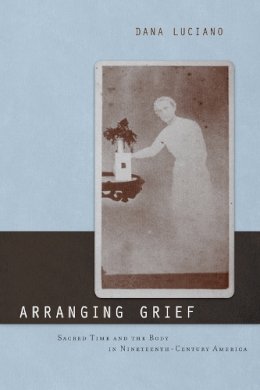
Arranging Grief: Sacred Time and the Body in Nineteenth-Century America
Dana Luciano
2008 Winner, MLA First Book Prize
Charting the proliferation of forms of mourning and memorial across a century increasingly concerned with their historical and temporal significance, Arranging Grief offers an innovative new view of the aesthetic, social, and political implications of emotion. Dana Luciano argues that the cultural plotting of grief provides a distinctive insight into the nineteenth-century American temporal imaginary, since grief both underwrote the social arrangements that supported the nation’s standard chronologies and sponsored other ways of advancing history.
Nineteenth-century appeals to grief, as Luciano demonstrates, diffused modes of “sacred time” across both religious and ostensibly secular frameworks, at once authorizing and unsettling established schemes of connection to the past and the future. Examining mourning manuals, sermons, memorial tracts, poetry, and fiction by Harriet Beecher Stowe, William Apess, James Fenimore Cooper, Catharine Maria Sedgwick, Susan Warner, Harriet E. Wilson, Herman Melville, Frances E. W. Harper, Frederick Douglass, Abraham Lincoln, Elizabeth Keckley, and Ralph Waldo Emerson, Luciano illustrates the ways that grief coupled the affective body to time. Drawing on formalist, Foucauldian, and psychoanalytic criticism, Arranging Grief shows how literary engagements with grief put forth ways of challenging deep-seated cultural assumptions about history, progress, bodies, and behaviors.
Product Details
About Dana Luciano
Reviews for Arranging Grief: Sacred Time and the Body in Nineteenth-Century America
Christopher Nealon,author of Foundlings: Lesbian and Gay Historical Emotion before Stonewall "An astounding, original, aesthetically profound rethinking of the productive temporalities of loss. A must-read book for any scholar of aesthetics, American literature, sexualityor any wanderer in the field of mourning."
Lauren Berlant,University of Chicago "This is a challenging, far-reaching, and original contribution to the analysis of American culture. . . . Recommended."
Choice
"[Luciano] offers astute readings of & chronobiopolitics . . . and argues persuasively for the importance of temporality in an expanded study of the history of sexuality."
American Literature
